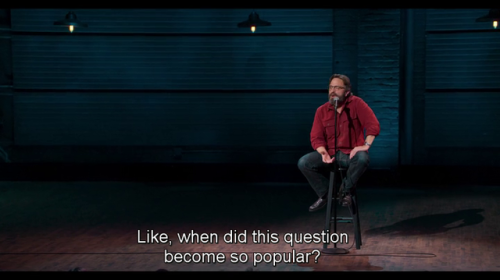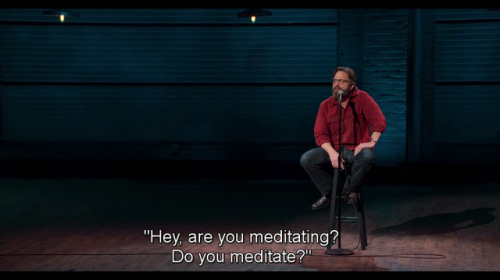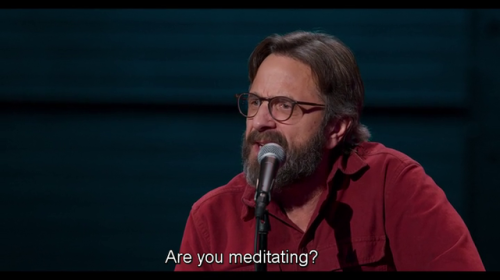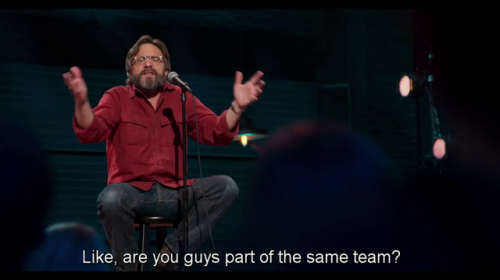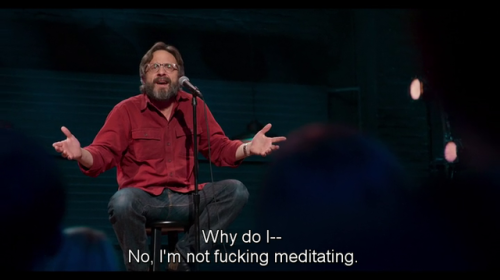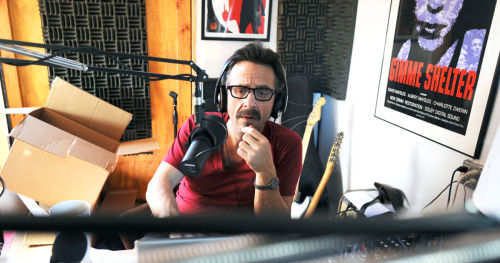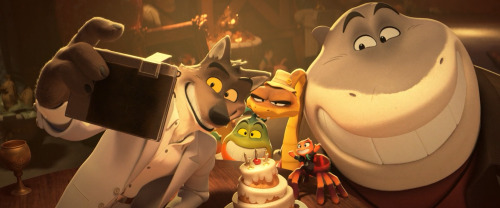#marc maron
Joker (2019)
Joker centers around the iconic arch nemesis and is an original, standalone story not seen before on the big screen. Oscar-nominee filmmaker Todd Phillips’ exploration of Arthur Fleck (Oscar-nominee Joaquin Phoenix), a man disregarded by society, is not only a gritty character study, but also a broader cautionary tale.
Directed by: Todd Phillips
Starring: Joaquin Phoenix, Zazie Beetz, Robert De Niro, Frances Conroy, Brett Cullen, Marc Maron, Douglas Hodge, Bryan Callen, Bill Camp, Shea Whigham, Glenn Fleshler, Josh Pais, Dante Pereira-Olson
Release date: October 4, 2019
I have a somewhat long commute by train so I listen to a lot of podcasts every week. I just listened to a string of fantastic interviews and wanted to share them.
Here’s the list:
- Abby Wambach on The Bill Simmons Podcast - Abby Wambach talks about her career, next steps, gender pay disparity, and more. Love her honesty. *Update: I don’t agree with Wambach’s “foreign guys” comment. An American is an American but there’s probably more nuance to that statement or I hope there is.
- Brian Grazer on WTF with Marc Maron - Brian Grazer talks about his life and how he made it to be one of the most successful producers.
- Dave Attell on You Made it Weird with Pete Holmes - Dave Attell is one of my favorite comedians. All the comedians I like are very thoughtful as Attell is.
- Katie Nolan on Re/code Decode - I didn’t know much about Katie Nolan and only saw her on some short clips on the Fox Sports app. She’s got an interesting story on how media personalities are starting on the Internet first more often these days (still don’t understand Vine stars).
- Lance Armstrong on the Joe Rogan Podcast - This might be the most honest interview I’ve heard Lance Armstrong give. He talks about how the doping scandal (everyone was doping on the Tour back then) has affected his family and seems to have some remorse about everything.
Watch and learn how to draw Mr.Wolf from The Bad Guys along side the cast.
So everyone’s thinking of Amy Poehler to take over The Daily Show…
And she’d be great, no argument from me. But let me make the case for Marc Maron.
Both Poehler and Maron are wickedly funny. Both have experience with comedy news – Poehler with SNL’s Weekend Update, Maron with the Air America morning show Morning Sedition.
But here’s Maron’s edge: since Morning Sedition ended, he’s been the host of the successful WTF With Marc Maron podcast, where he’s shown himself to be a tremendous interviewer. His existential shaggy dog stories, laid back attitude, and deeply personal style of humor would mean a real gear shift for the show, but I think his interviewing skills would more than balance that out.
Anyways, it’s a thought. It probably won’t happen – and neither will Poehler – but it’d be nice to see.
Just playing “what if?”
Post link
Watching last week’s episode of Maron, it was interesting that Marc Maron decided to do an episode based on cultural differences in comedy and why it does or does not matter. It’s a very good episode but one part of the show I really liked is when Maron begins to talk with comedian Bruce Bruce and they get into what a white comedian is able to get away with versus what a black comedian can get away with but more importantly, it gets into how and why a black comedian has to do a show one way with black audiences and do it another way with white (arguably “more mainstream”) audiences. They get into how Richard Pryor pretty much didn’t change his act throughout his career and that if Pryor was a new comic today, he would not be able to get away with what he did in his time.
A perfect example of this is to explore Redd Foxx’s vast discography. For most of his albums released by the Dootone/Dootoo record labels, those were performed in front of “down home” audiences, a black nightclub where his routines were recorded and then transferred over to be released on vinyl. Those are some of the best comedy albums ever released, and while Foxx was never that explicit in those days, he was raw and blunt. The only time he cursed was at the end, when he told the crowd that if anyone in the audience ever got offended by his material, he would like to apologize sincerely from the bottom of his heart and that he doesn’t give a shit. Otherwise, Foxx found himself talking about corksoakers, spelling the word “bathroom” with his tongue during cunnilingus, racing horses, and discovering his lady is pregnant but has a Mexican child “and there’s no Mexican blood… in me”. In the early 1960′s, that was the kind of records that would be considered “behind the counter” but that was most likely in reference to those records having to be safe in white record stores. If you were to go to a black record store, you’d probably find every Redd Foxx album in the comedy section along with loads of albums made by comediennes and drag queens (and yes, there are many of both).
As Redd Foxx started to get more attention outside of the black comedy clubs, he found himself signed to a Warner Bros. subsidiary label called Loma, created by Bob Krasnow (the brief existence of Loma would eventually lead to him creating the incredible Blue Thumb record label, so consider Loma a pre-cursor). Foxx’s albums were recorded in Hollywood to a wider/whiter audience, and he did have to “polish” his act in order to be accessible to those audiences. It comes off like a lounge singer who wants to do material that will please those crowds and yet the humor is still as strong as anything Foxx did on those Dootone/Dooto albums. It just happens to be a bit milder, a bit cleaner, not as suggestive. Foxx recorded what would be his last album for Loma called Foxx-A-Delic, done in Las Vegas. Foxx was making it into the big time or perhaps, looking for bigger. With the close of Loma, Warner Bros. proper would release the album as “Live” Las Vegas and Foxx was free to find another label. At the same time, Dootone Records continued to dig into their tape library and release Foxx albums that would be “more suitable” for black audiences, and they were sold in mainstream stores as well, to let new fans know where he came from. In 1970, Foxx found himself on the King record label, which had been known as the home of James Brown for years. He ended up only one album for King and while it too was recorded in Los Angeles, not in a “Hollywood club” but the Redd Foxx club. You can say he had every reason to drop his pants with a nude woman and said “this is my album cover, I’m home now.” Foxx was heading up and with major label success and his own club, it was a matter of time before he found himself as Watts junk dealer Fred G. Sanford on a successful NBC situation comedy, Sanford & Son.
After the success of Sanford & Son, Foxx found himself back into the Warner fold for one album, but this time it was on Atlantic. Rather than play it safe, he went raw and dirty and you can say he was dirtier than how he was on those Dootone albums. It could easily be said that the success of Foxx on Loma/Warner Bros. may have lead to Pryor being signed by Warner Bros. for years and allowed Pryor to be as open and as uncensored as he was. Perhaps due to Pryor’s success, it lead to Foxx coming up with the material that would become You Gotta Wash Your Ass. Audiences who loved Sanford & Son probably ended up very shocked to hear their favorite junk dealer speaking about doing a 69 with a woman, smelling something but wondering if it is a filthy/un-wiped anus and realizing “SHIT, THE NOSE KNOWS!” That was the dirty Foxx older fans had come to know and love and he would never return to that phase again.
Nonetheless, cable television has almost eliminated the power that comedy albums used to have, as being able to watch a routine on HBO eliminated the need to have to buy a record. However, one is able to watch a comedy special and still get a laugh and for some comedians, it’s great to watch someone’s early days vs. what they would become. For some, it is a difference between doing a routine for a “down home” audience vs. the bigger, more profitable crowds. Is it any different? Depends on your perspective. Maybe for some comedians, it becomes a bit of “I want to test the limits of the crowds, I want to see how far I can go but still move the crowd.“ That’s the best in comedy, understanding the power of the word and seeing what they can get away with while knowing it’s about going to the edge and always going beyond a barrier or two.
The Bad Guys Movie interview, but it’s just Craig, Marc and Anthony making eachother laugh. I love them
Idk, this is just a compilation of different interviews combined together, where these 3 are just making others laugh and being kind of chaotic. Took forever to edit, and was originally 11 minutes long, so I cut it to 6 minutes.
I did my best
cate blanchett talking in a podcast about a weird dream she had where people were ingesting marijuana in strange ways for example rubbing it on their armpits and she had no idea how that had got into her brain
ma’am I know exactly how that got into your brain
portrait of a lady on fire

